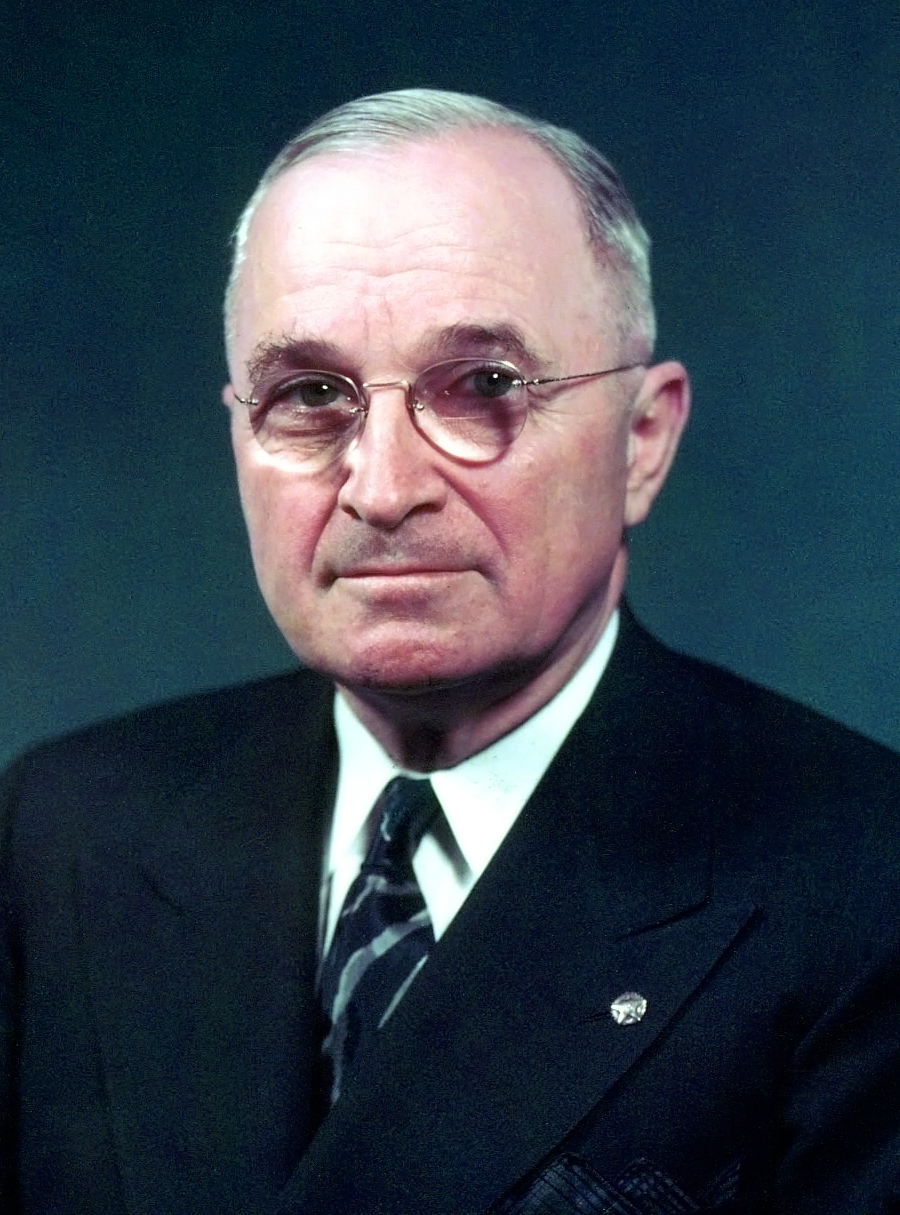More languages
More actions
Verda.Majo (talk | contribs) mNo edit summary Tag: Visual edit |
(Loyalty oaths) Tag: Visual edit |
||
| Line 1: | Line 1: | ||
'''Harry S. Truman''' (May 8, 1884 | {{Infobox politician|name=Harry S. Truman|image_size=200|birth_date=May 8, 1884|birth_place=Lamar, [[Missouri]], [[United States of America|United States]]|death_date=December 26, 1972|death_place=Kansas City, Missouri, United States|nationality=Statesian|political_orientation=[[Anti-communism]]|political_party=[[Democratic Party (United States)|Democratic Party]]|image=Harry Truman.png}} | ||
'''Harry S. Truman''' (May 8, 1884 – December 26, 1972) was the 33rd President of the [[United States of America]] from 1945 to 1953. His presidency is associated with the final stages of the [[Second World War]] and the early years of the [[Cold War]].<ref>[https://www.britannica.com/biography/Harry-S-Truman “Harry S. Truman | U.S. President & History | Britannica.”] ''Encyclopædia Britannica''.</ref> Notable events occurring under Truman's presidency are the [[atomic bombings of Hiroshima and Nagasaki]],<ref>[https://www.workers.org/2005/world/hiroshima-0811/ “Truman Was a War Criminal.”] 2023. Workers.org. [https://web.archive.org/web/20220925051251/https://www.workers.org/2005/world/hiroshima-0811/ Archived].</ref> the enacting of the [[Marshall Plan]], the founding of [[North Atlantic Treaty Organization|NATO]], and the [[Korean War|invasion of Korea]]. Truman also serves as the namesake of the [[Truman Doctrine]],<ref>[https://www.rt.com/news/years-since-truman-doctrine/ “60 Years since Truman Doctrine.”] [[RT (TV Network)|RT]] International. March 13, 2007. [https://web.archive.org/web/20220522235047/https://www.rt.com/news/years-since-truman-doctrine/ Archived] 2022-05-22.</ref> which represented a shift in U.S. foreign policy from a nominally isolationist policy to a more openly interventionist one, in which Truman argued that the United States was compelled to assist "free peoples" in their struggles against so-called "[[Totalitarianism|totalitarian]] regimes". The Truman Doctrine was one of the guiding notions of the U.S.'s [[United States imperialism|imperialist]], [[Anti-communism|anti-communist]] efforts at [[containment]] and rollback of the [[Union of Soviet Socialist Republics (1922–1991)|Soviet Union]] and other socialist nations and liberation movements throughout the Cold War.<ref>[https://history.state.gov/milestones/1945-1952/truman-doctrine “Milestones: 1945–1952 - Office of the Historian.”] State.gov. [https://web.archive.org/web/20230326135104/https://history.state.gov/milestones/1945-1952/truman-doctrine Archived] 2023-03-06.</ref> In 1947, Truman issued an order requiring federal employees to take loyalty oaths.<ref name=":0233">{{Citation|author=Albert Szymanski|year=1984|title=Human Rights in the Soviet Union|chapter=The Land of the Free|page=180|pdf=https://cloudflare-ipfs.com/ipfs/bafykbzaceazdmtb2y3qq27fve5ib3gk7uv2unt6ae2xss74xmfpur7k5uhl5m?filename=Albert%20Szymanski%20-%20Human%20Rights%20in%20the%20Soviet%20Union_%20Including%20Comparisons%20with%20the%20U.S.A.-Zed%20Books%20Ltd.%20%281984%29.pdf|city=London|publisher=Zed Books Ltd|isbn=0862320186|lg=https://libgen.rs/book/index.php?md5=C597B1232D9EA6B0F3DCB438D7E15A81}}</ref> | |||
== References == | == References == | ||
<references /> | <references /> | ||
[[Category:Presidents of the United States]] | [[Category:Presidents of the United States]] | ||
Revision as of 23:32, 16 April 2023
Harry S. Truman | |
|---|---|
 | |
| Born | May 8, 1884 Lamar, Missouri, United States |
| Died | December 26, 1972 Kansas City, Missouri, United States |
| Nationality | Statesian |
| Political orientation | Anti-communism |
| Political party | Democratic Party |
Harry S. Truman (May 8, 1884 – December 26, 1972) was the 33rd President of the United States of America from 1945 to 1953. His presidency is associated with the final stages of the Second World War and the early years of the Cold War.[1] Notable events occurring under Truman's presidency are the atomic bombings of Hiroshima and Nagasaki,[2] the enacting of the Marshall Plan, the founding of NATO, and the invasion of Korea. Truman also serves as the namesake of the Truman Doctrine,[3] which represented a shift in U.S. foreign policy from a nominally isolationist policy to a more openly interventionist one, in which Truman argued that the United States was compelled to assist "free peoples" in their struggles against so-called "totalitarian regimes". The Truman Doctrine was one of the guiding notions of the U.S.'s imperialist, anti-communist efforts at containment and rollback of the Soviet Union and other socialist nations and liberation movements throughout the Cold War.[4] In 1947, Truman issued an order requiring federal employees to take loyalty oaths.[5]
References
- ↑ “Harry S. Truman | U.S. President & History | Britannica.” Encyclopædia Britannica.
- ↑ “Truman Was a War Criminal.” 2023. Workers.org. Archived.
- ↑ “60 Years since Truman Doctrine.” RT International. March 13, 2007. Archived 2022-05-22.
- ↑ “Milestones: 1945–1952 - Office of the Historian.” State.gov. Archived 2023-03-06.
- ↑ Albert Szymanski (1984). Human Rights in the Soviet Union: 'The Land of the Free' (p. 180). [PDF] London: Zed Books Ltd. ISBN 0862320186 [LG]
